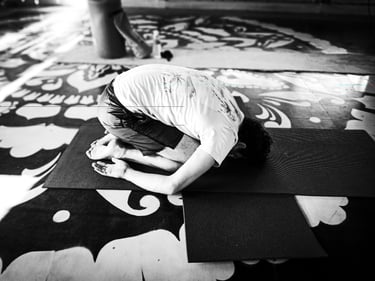Chronic Stress : The Body Reacts


Where The Body Stores Stress
Stress can be a double-edged sword, serving as a motivator in small doses but wreaking havoc on our bodies when it becomes chronic. Persistent stress can manifest physically, leading to tension and discomfort that can spread throughout various parts of our bodies.
When stress takes hold, our muscles often bear the brunt, tensing up and contracting, creating a chain reaction from mind to body. Chronic stress particularly triggers the sympathetic nervous system, which keeps the body in a prolonged "fight or flight" state. This constant activation can lead to muscle tension, headaches, and in severe cases, chronic pain, particularly in the back and neck areas.
Abdomen
The digestive system is also highly sensitive to stress. The "gut-brain axis" links the central nervous system to the digestive tract, meaning that emotional stress can disrupt digestive processes. Stress may contribute to gastrointestinal issues such as bloating, constipation, diarrhoea, and even irritable bowel syndrome (IBS). In extreme cases of fear or anxiety, some people might experience loss of bladder or bowel control.
Chest
Stress also affects the heart and lungs. Emotional stress can cause chest tightness, shortness of breath, and heart palpitations, which might mimic symptoms of a heart attack in some individuals. This is often due to shallow breathing, which reduces oxygen intake and can exacerbate feelings of panic or anxiety.
Head
In the head, stress frequently manifests as tension headaches or migraines, particularly when one feels overwhelmed or out of control. The shoulders and neck are common areas where stress-induced tension accumulates, highlighting the importance of regular exercises like shoulder rolls and neck stretches to alleviate discomfort.
Jaw
Stress can also impact the voice and jaw. Persistent stress might lead to speech difficulties, as anxiety can cause the voice to tremble or become strained. Additionally, jaw clenching and teeth grinding (bruxism) are common stress responses that contribute to neck strain, headaches, and facial tension.
Hips
Even the hips can be affected by emotional stress, leading to tightness and discomfort in this area. This can sometimes contribute to lower back pain.
Stress is also notorious for disrupting sleep cycles. Chronic stress or periods of significant life changes can lead to insomnia or poor sleep quality, further compromising overall well-being.
In essence, stress can permeate every aspect of our physical being, highlighting the importance of mindfulness, self-care practices, and stress management techniques to mitigate its effects.
Further Reading
The Stress Triangle : The First Muscles to Get Tense
Importance of Sleep : Repair, Restore and Revitalise
The Importance of Relaxation : The Most Important Pose


More Insights
